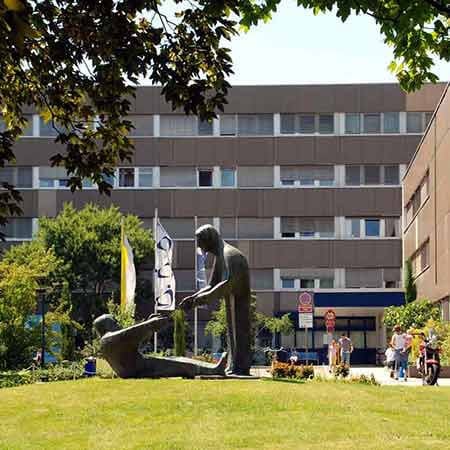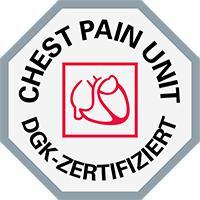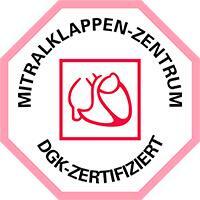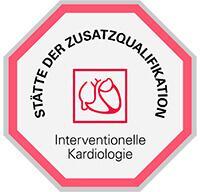Atrioventricular block is the most common type of cardiac conduction disorder. The initial degrees of AV block are detected in many children, young people and athletes. They are not dangerous and do not require treatment, but severe blocks pose a health threat: they lead to bradycardia, cause fainting, and can become a cause of sudden cardiac death. The treatment of atrioventricular block abroad involves the use of permanent cardiac pacing.
Content
- What is AV heart block
- Symptoms
- Is atrioventricular block dangerous
- Treatment principles
- Indications for pacemaker implantation
- How is the pacemaker implanted
- Why is it worth undergoing treatment abroad
- Treatment in Europe at an affordable price
What is AV heart block
For the heart to contract, electrical impulses must travel through the myocardium (heart muscle). They are generated by the sinus node located in the right atrium, from which the impulse spreads throughout the heart. However, the block of the cardiac conduction system disrupts the conduction of the impulse from the atria to the ventricles.
This condition is called atrioventricular (AV) block. The disease can have three degrees of severity:
- 1st degree heart block – all impulses reach the ventricles, but they travel slower than usual.
- 2nd degree – some of the impulses do not reach the ventricles.
- 3rd degree – not a single impulse reaches the ventricles of the heart.
Even with a complete block, the heart does not stop, as reserve pacemakers are activated, but they provide a lower pulse rate. The ventricles contract more slowly, so the blood supply to the brain is impaired.
Symptoms
Symptoms are one of the main indications for surgical treatment of AV block. Due to a slowdown in the heart rate, a person feels fatigue, suffers from dizziness, and experiences a reduced exercise tolerance. The more severe the block, the worse the person tolerates stress, since against the background of physical work, the tissue demand for oxygen increases, and the heart does not contract quickly enough to provide it.
The severe block contributes to the development of Morgagni-Adams-Stokes syndrome. Periodically, the heart rate decreases so much that the brain receives less oxygen and "turns off". A person loses consciousness, and may suffer from convulsions, involuntary defecation and urination. The presence of such attacks significantly increases the risk of sudden cardiac death.
Is atrioventricular block dangerous
In most cases, 1st and 2nd degree AV blocks are not dangerous. The condition does not progress, does not significantly affect the pulse rate, does not impair hemodynamics. Such patients do not need treatment. They do not experience any symptoms and do not suffer from complications.
Sometimes even 1st degree AV block may lead to adverse consequences. Although with this type of heart block all impulses travel from the atria to the ventricles, sometimes it takes too much time. The form of pathology is considered unfavorable when the PQ interval is increased to 0.3 seconds. On the cardiogram, this interval reflects the time of the impulse travel from the atria to the ventricles. In this case, even with 1st degree heart block, the patient may need the treatment of AV block.
This unfavorable form rarely develops as a result of diseases. It usually occurs as a complication of a medical procedure: ablation of the fast path of impulses. The procedure is performed for AVRT (atrioventricular reentrant tachycardia). In this heart disease, the conducting beam is divided into two, and therefore heartbeats occur due to the circulation of impulses. Nonetheless, when a fast beam is destroyed, a slow one remains, which conducts electrical impulses for too long.
An unfavorable form of even the early degrees of AV block (type 1 first-degree and second-degree) can lead to long-term consequences:
- Deterioration of exercise capacity.
- Left ventricular dilatation, dilated cardiomyopathy.
- Heart failure.
However, in most cases, patients with the early stages of AV block do not suffer from symptoms and do not require treatment. The therapy is mostly provided to patients with type 2 second-degree AV block or patients with complete AV block (third-degree). Such patients have severe and life-threatening complications. These are as follows:
- Morgagni-Adams-Stokes syndrome (it is manifested by loss of consciousness due to oxygen starvation of the brain, sudden cardiac death is possible as well).
- Atrial fibrillation, which provokes the formation of blood clots in the heart chamber, increases the risk of thromboembolic complications (for example, ischemic stroke).
- Ventricular fibrillation is a severe arrhythmia that is fatal without emergency help.
Treatment principles
The causes of AV block can be reversible and irreversible.
In case of reversible causes, drug therapy or temporary cardiac pacing can be used. At the same time, doctors provide the treatment aimed at eliminating the block, or simply wait until it disappears by itself, for example, an AV block develops and then disappears early after heart surgery.
In case of irreversible causes, neither drug therapy nor monitoring usually makes sense. AV block is associated with damage to the cardiac conduction system, and it cannot be restored. Drug treatment is used only for the relief of emergency conditions, for example, a Morgagni-Adams-Stokes attack. To obtain long-term results, the pacemaker implantation is required.
Treatment goals:
- Symptom relief.
- Improved exercise tolerance.
- Reduced risk of sudden cardiac death.
The principle of treatment is based on the implantation of a device that imposes its own rhythm on the heart. It does not work constantly, but gives impulses only in those cases when the frequency of contractions becomes low or the pauses of the rhythm are too long.
Indications for pacemaker implantation
In some cases, implantation of a pacemaker is vital. In other situations, the issue is discussed with the patient. When making a decision, doctors take into account the presence of symptoms, age, lifestyle (level of physical activity).
During the diagnostics, it is determined whether the block is reversible or irreversible, permanent or occurs periodically, whether the risk of progression is high or low, whether slip rhythms appear from the pacemakers of the lower level, especially those located below the atrioventricular node. Consideration is given to the heart rate, block level, type and severity of heart disease.
Pacemaker implantation is recommended for patients with the following conditions:
- Permanent complete or type 2 second-degree atrioventricular block.
- Recurrent severe block, if the patient has an enlarged heart, heart failure and other concomitant pathologies.
- Rhythm pauses for more than 3-5 seconds.
- Heart rate less than 40 per minute during the day or less than 35 per minute during a night's sleep.
- Rhythms appear from pacemakers below the level of the AV node.
- Manifestation of symptoms at rest.
- Symptoms arising during exercise that are not associated with myocardial ischemia.
- According to the electrophysiological study, the block is at the level of the atrioventricular node or below.
One of the decisive factors in choosing the tactics of patient treatment is the presence of symptoms, the interconnection of which with AV block has been proven. With the presence of symptoms, a pacemaker can be implanted even for cardiac conduction disturbances of low severity. To prove the interconnection of symptoms with the block, a long-term monitoring of the rhythm is carried out. The episodes of weakness, dizziness, darkening of the eyes, etc. should coincide in time with a decreased heart rate.
In addition, heart failure can be the reason for pacemaker implantation. With the concomitant AV block, the heart beats more slowly. In a healthy person, this would not lead to symptoms, but heart failure contributes to the decreased effectiveness of hemodynamics. After implanting a pacemaker, the patient's heart rate increases, which results in more efficient circulation, fewer symptoms, and better quality of life.
How is the pacemaker implanted
The pacemaker implantation is a minimally invasive surgery that does not require general anesthesia. A person does not even need to stay in the hospital. All manipulations are performed under local anesthesia.
The doctor makes an incision in the skin of the chest up to 5 cm long, and implants the body of the pacemaker under the skin. The pacemaker leads are inserted into the heart through the blood vessels.
Pacing modes for the treatment of atrioventricular block can be as follows:
- Dual-chamber pacing.
- Single-chamber ventricular pacing.
- Single-chamber P-synchronous pacing.
The standard option is dual-chamber pacing. One pacemaker lead is inserted into the right atrium, while the other into the right ventricle. This therapy is synchronizing. The device can send impulses to both the atria and the ventricles, thereby ensuring a consistent contraction of the chambers of the heart.
Occasionally, single-chamber ventricular pacing can be used. Such a pacemaker is cheaper, but it does not provide synchronous contraction of the atria and ventricles. There is no pacemaker lead in the atrium, so they contract in a normal rhythm. The pacemaker lead will only stimulate the contraction of the ventricles if they become too infrequent. The method of pacing is used in patients with chronic atrial fibrillation or in other situations when the atria do not contract rhythmically.
Another treatment option for AV block is single-chamber P-synchronous cardiac pacing. Doctors can conduct pacing of only the ventricles, but the activity of the atria is monitored, and therefore the contractions of the heart chambers are synchronized. This type of pacing is possible only in patients with normal sinus node function, that is, with a sufficiently high frequency of atrial contraction, when only the ventricles need to be paced.
Why is it worth undergoing treatment abroad
Many patients with heart block travel abroad for treatment. Doctors in Europe implant the latest pacemakers that do not damage the heart muscle even with prolonged use, provide a minimum risk of complications, and have a function of frequency adaptation: the ability to increase the heart rate against the background of physical activity.
There are several reasons for you to undergo treatment of AV block abroad:
- High-precision diagnostics aimed not only at establishing the type of heart block and its severity, but also at determining the cause of the pathology.
- Whenever possible, treatment is aimed at eliminating the cause of the block so that the patient does not have to undergo pacemaker implantation.
- Minimally invasive, very accurate, and safe placement of a pacemaker.
- The use of the latest models of these devices, which are reliable and multifunctional.
- Individual selection of the pacing mode and fine tuning of the device.
- The possibility of simultaneous treatment of several heart diseases at once: 50% of patients with heart block have myocardial ischemia, 25% have arterial hypertension, and 10% have heart defects.
The patients with severe arrhythmias who undergo treatment abroad can count on high-quality and safe medical care. Even with the worst types of heart block, the heart rate can be raised to normal levels, thus completely relieving symptoms and preventing dangerous complications.
Treatment in Europe at an affordable price
To undergo treatment in one of the European hospitals, please use the services of the Booking Health company. On our website, you can find out the cost of treatment in Europe and compare prices in order to book a medical care program at a favorable price. The treatment in Europe will be easier and faster for you, and the cost of treatment will be lower.
You are welcome to leave your request on the Booking Health website. Our specialist will contact you and provide a free consultation on medical treatment in Europe. Booking Health will take care of the organization of your trip abroad. We will provide the following benefits for you:
- We will select a hospital for treatment in Europe, whose doctors specialize in the treatment of atrioventricular block and achieve the best results.
- We will solve the problem of the language barrier and help to establish communication with your attending physician.
- We will reduce the waiting time for the medical care program. You will undergo treatment on the most suitable dates.
- We will reduce the price. The cost of treatment in European hospitals will be reduced due to the lack of overpricing and additional coefficients for foreign patients.
- We will help you to solve any organizational issues: we will draw up documents, meet you abroad and take you to the hospital, book a hotel, and provide interpreting services.
- We will prepare a program and translate medical documents. You will not need to repeat the previously performed diagnostic procedures.
- We will help you keep in touch with the hospital after treatment in Europe.
- We will arrange additional diagnostic examinations and treatment in European hospitals, if required.
- We will buy medicines in another country and forward them to your native country.
The world's leading doctors will take care of your health. The Booking Health specialists will help reduce the cost of treatment, organize your trip, and you can fully focus on restoring your health.
Authors:
This article was edited by medical experts, board-certified doctors Dr. Nadezhda Ivanisova, and Dr. Bohdan Mykhalniuk. For the treatment of the conditions referred to in the article, you must consult a doctor; the information in the article is not intended for self-medication!
Our editorial policy, which details our commitment to accuracy and transparency, is available here. Click this link to review our policies.


















